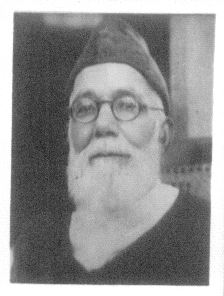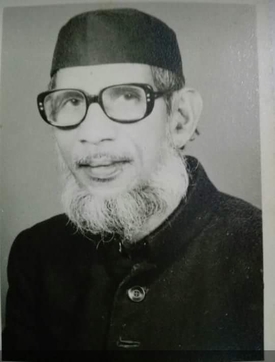Related Research Articles

Jamaat-e-Islami, or Jamaat as it is commonly known, is an Islamist political party based in Pakistan and founded by Abul Ala Maududi. It is the Pakistani successor to Jamaat-e-Islami, which was founded in colonial India in 1941. Its objective is the transformation of Pakistan into an Islamic state, governed by Sharia law, through a gradual legal, and political process. JI strongly opposes capitalism, communism, liberalism, and secularism as well as economic practices such as offering bank interest. JI is a 'vanguard party', whose members are intended to be leaders spreading party beliefs and influence. Supporters not thought qualified to be members may become 'affiliates', and beneath them are 'sympathizers'. The party leader is called an 'ameer'. Although it does not have a large popular following, the party is quite influential and considered one of the major Islamic movements in Pakistan, along with Deobandi and Barelvi.

Azamgarh is a city in the Indian state of Uttar Pradesh. It is the headquarters of Azamgarh division, which consists of Ballia, Mau and Azamgarh districts. Azamgarh is situated on the bank of Tamsa River (Tons). It is located 268 km (167 mi) east of the state capital Lucknow and 809 km from the national capital, Delhi.

Israr Ahmad, was a Pakistani Islamic scholar, orator and theologian. He developed a following in South Asia but also among some South Asian Muslims in the Middle East, Western Europe, and North America.
Mian Tufail Mohammad was a Pakistani religious leader, lawyer, Islamic theologian, and former Secretary General and Emir of Jamaat-e-Islami Pakistan party.

Amin Ahsan Islahi, was an Indian Muslim scholar best known for his Urdu exegesis of the Quran, Tadabbur-i-Quran "Pondering on the Quran", which he based on Hamiduddin Farahi's, idea of thematic and structural coherence in the Qur'an.
Hamiduddin Farahi was an Indian Islamic scholar known for his work on the concept of nazm, or coherence, in the Quran. The modernist Farahi school is named after him.

Abul A'la al-Maududi was an Islamic scholar, Islamist ideologue, Muslim philosopher, jurist, historian, journalist, activist, and scholar active in British India and later, following the partition, in Pakistan. Described by Wilfred Cantwell Smith as "the most systematic thinker of modern Islam", his numerous works, which "covered a range of disciplines such as Qur'anic exegesis, hadith, law, philosophy, and history", were written in Urdu, but then translated into English, Arabic, Hindi, Bengali, Telugu, Tamil, Kannada, Burmese, Malayalam and many other languages. He sought to revive Islam, and to propagate what he understood to be "true Islam". He believed that Islam was essential for politics and that it was necessary to institute sharia and preserve Islamic culture similarly as to that during the reign of the Rashidun Caliphs and abandon immorality, from what he viewed as the evils of secularism, nationalism and socialism, which he understood to be the influence of Western imperialism.
Syed Jalaluddin Umri was an Islamic scholar and writer. He was the Amir of Jamaat-e-Islami Hind from 2007 to 2019.
Madrasatul Islah is a traditional Islamic institution of learning and a renowned center of oriental and Islamic studies at Sarai Mir in the Azamgarh district of Uttar Pradesh. It was started by Mawlana Muhammad Shafi in 1908 along with participation of prominent scholars and religious seminaries of the area. The madrassa was established with a different syllabus and ideology than that of Darul Uloom Deoband and Darul Uloom Nadwatul Ulama. Shibli Nomani and Hamiduddin Farahi are regarded as chief architects of this madrasa.

Islamic Publishing House is a leading publisher of Islamic literature in the state of Kerala, India. It was founded in 1945 as the official publication division of Jama’at-e-Islami Hind, Kerala chapter. Its headquarters is in Kozhikode, Kerala.

Chaudhry Niaz Ali Khan was a civil engineer, agriculturalist, and philanthropist who founded "Dar ul Islam Movement" and "Dar ul Islam Trust" in South Asia and "Dar ul Islam Trust" Institutes in Pathankot and Jauharabad. Besides a philanthropist, Niaz was also a civil servant, and a landowner. He was the member of All-India Muslim League and a participant of the Pakistan Movement with the ultimate aim of creating the Muslim-majority areas of British India.
Jamaat-e-Islami is an Islamist movement founded in 1941 in British India by the Islamist author, theorist, and socio-political philosopher, Syed Abul Ala Maududi. It developed under the umbrella of Darul Uloom Deoband.
Maulana Naeem Siddiqui was a Pakistani Islamic scholar, writer and politician. He was among the founder-members of the Jamaat-e-Islami and a close associate of Abul A'la Maududi and Amin Ahsan Islahi.
Mawlana Abdur Rahim was a Bangladeshi Islamic scholar and well known politician in South Asia and the first promoter of the Jamaat-e-Islami Bangladesh.

Nizāmuddīn Asīr Adrawi was an Indian Sunni Muslim scholar, biographer, historian and author in the Urdu language. He established Madrassa Darus Salam in Adari and served as Officer In Charge of Jamiat Ulama-e-Hind in Lucknow from 1974 to 1978.

Abu Ahmad Muhammad Abdullah Azami or Ziya-ur-Rahman Azmi was an Indian-born Saudi Arabian Islamic scholar who served as the Dean of the Department of Hadith at the Islamic University of Madinah. He is known for his compilation of hadith titled Al-Jaami’ ul-Kamil fi al-Hadith al-Sahih al-Shamil which contains all authentic Prophetic narrations as per his claim.
Muhammad Athar Qureshi was a prominent Pakistani politician and religious leader. A member of Jamaat-e-Islami, he was also elected as a member of Sindh Provincial Assembly from 1985 to 1988.

The Farahi school is the school of thought originated in the Indian subcontinent. It is named after Hamiduddin Farahi, the cousin and student of the Indian Sunni Hanafi scholar Shibli Nomani. Unlike, the traditional schools of thought, which focus more on taqlid, it is more based on the self-source of reasoning (Ijtihad).
Quran Ki Chaar Buniyadi Istlahein is a 1944 Urdu Islamic book by Abul A'la Maududi. The book is considered to have fundamental importance in the religious thoughts of the author which present Islam as a comprehensive system of life.

Tabeer Ki Ghalti is a 1963 Urdu book by Wahiduddin Khan. The book is a critique of Abul A'la Maududi's interpretation of Islam in general and his book Quran Ki Chaar Buniyadi Istlahein in particular. The book was the reason for author's exclusion from Jamat e Islami.
References
- ↑ "Profile of Sadruddin Islahi". Rekhta. Retrieved 6 January 2022.
- 1 2 3 4 Mehdi, Dr, Taabish. "مولانا صدرالدین اصلاحی ؒ". Zindagi e Nau. Retrieved 6 January 2022.
{{cite web}}: CS1 maint: multiple names: authors list (link) - 1 2 "Maulana Sadruddin Islahi is no more". IFEW. Retrieved 2 March 2022.
- 1 2 Azhar, Shaban Syed. "صدرالدین اصلاحی صاحب کی کتاب فریضہ اقامتِ دین پر تبصرہ". Afkar e Nau. Retrieved 6 January 2022.
- ↑ Nadvi, Dr. Muhammad Razi ul Islam. "مولانا صدر الدین اصلاحی کے افکار کا تنقیدی مطالعہ". Qindeel Online. Retrieved 6 January 2022.
- ↑ "Books of Sadruddin Islahi". Rekhta. Retrieved 6 January 2022.